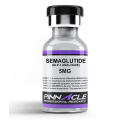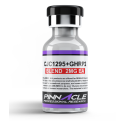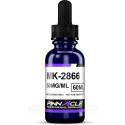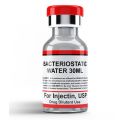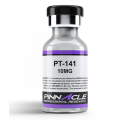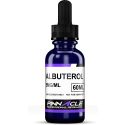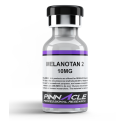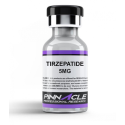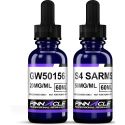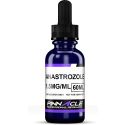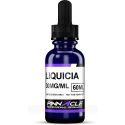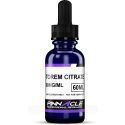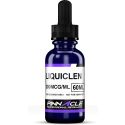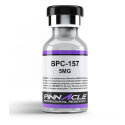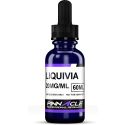How Physicians Are Using Peptide Therapy for Wellness
This website's contents, articles and product information are all provided purely for educational and informational purposes. The products that are offered on this platform are only meant to be used in in vitro research. The word "in vitro," which comes from the Latin "in glass," describes research that is done outside of a living creature. It is important to remember that these products are not pharmaceuticals or medicines, and the FDA has not approved them for use in the diagnosis, treatment, or prevention of any illnesses or disorders. It is legally forbidden for these goods to be ingested by humans or animals.
Peptide therapy is an exciting new tool that physicians are increasingly using to help patients optimize wellness and counteract age-related decline. As research continues to reveal the remarkable power of peptides to target specific health goals, more and more doctors are offering peptide treatments as part of anti-aging and wellness programs.
What are Peptides and How Do They Work?
Peptides are short chains of amino acids that occur naturally in the body and play various important roles. Some supplement peptides mimic natural peptides and work similarly. When administered, they bind to receptors in the body and stimulate certain functions and biological processes.
Peptides used for wellness and anti-aging purposes are highly selective and targeted. For example, some peptides specifically help amplify growth hormone production in the body, while others boost tissue repair. This makes peptides appealing from a medical perspective - they can pinpoint and enhance particular bodily functions and systems.
Unlike many supplements on the market, where you can find pharmaceutical-grade peptides for sale, these peptides are compounded in regulated pharmacies under stringent sterile conditions. This ensures both purity and accuracy in dosing protocols. Liquid chromatography-mass spectrometry testing confirms the purity and identity of each peptide batch.
Wellness clinics offering peptide therapy will sequence peptides specifically for each patient. Doses are carefully calibrated to maximize benefits while avoiding side effects. This level of personalization and precision is not possible with traditional supplements in pill form.
Key Benefits of Peptide Therapy for Wellness
Extensive research over the past decade has revealed that various peptides have remarkable potential to enhance wellness and counteract age-related decline in areas like:
Anti-Aging Effects
- Growth hormone peptides can help counteract decreases in HGH levels due to aging, improving body composition, skin elasticity, bone mineral density, immune function, cholesterol profiles, and cognitive function. [1]
- Epithalon has been shown to increase lifespan in animal studies by delaying mechanisms of aging. It helps regulate the hypothalamic-pituitary axis. [2]
- Thymalin boosts T cell immunity and has extended lifespans in studies by up to 40%. It supports healthy inflammation responses. [3]
Cognitive Enhancement
- Noopept, Semax, Selank, Cerebrolysin and other nootropic peptides amplify cognitive processing, enhance memory formation, improve clarity of thought, elevate mood, and protect the brain against oxidative stress. [4]
- Neural growth factors like Cerebrolysin and P21 can stimulate neurogenesis - the growth of new brain cells. This may help reverse aspects of age-related cognitive decline. [5]
Improved Sleep Quality
- Delta sleep inducing peptide (DSIP) enhances deep restorative slow wave sleep. This leaves you feeling genuinely refreshed and full of energy the next day. [6]
- Insulin growth factor 1 (IGF-1) can improve sleep quality and duration, allowing both the body and brain to recharge each night. [7]
Enhanced Energy and Performance
- Certain peptides act as metabolic enhancers, increasing energy expenditure, promoting weight loss, and countering fatigue. [8]
- Follistatin 344 and 315 boost muscle growth, strength, stamina, exercise performance. They prevent muscle breakdown after intense activity. [9]
- Thymosin Beta 4 accelerates recovery following injuries or intense training. It mobilizes stem cells to heal damaged tissues. [10]
Weight Management and Body Composition
- Peptides like AOD9604, CJC 1295, Sermorelin and others assist with fat burning especially in the midsection while preserving lean muscle mass. [11]
- They support a healthy metabolism and balance mechanisms that regulate hunger, portion control and eating habits. [12]
- Some peptides have been shown to stop differentiation of pre-fat cells, preventing new fat formation (adipogenesis). [13]
Skin and Hair Regeneration
- Collagen peptides taken orally reduce wrinkles, dryness, and improve skin elasticity and hydration. They support collagen production. [14]
- Copper peptides applied topically firm and tighten skin by stimulating collagen, elastin and glycosaminoglycans. [15]
- Specific hair growth peptides activate follicles to grow thicker, fuller hair and prevent hair loss. [16]
Enhanced Sexual Function
- PT-141 significantly enhances arousal, sexual desire, pleasure, stamina, sensation, and orgasmic function in both men and women. [17]
- Vyleesi activates melanocortin receptors linked to sexual stimulation, especially in premenopausal women. [18]
- MT2 stimulates sexual arousal pathways in the brain. It also aids erections via increased vasodilation. [19]
Improved Mood and Mental Wellbeing
- Cerebrolysin contains brain-derived neurotrophic factors that can improve mood and enhance feelings of wellbeing. [20]
- Selank provides anxiolytic effects to reduce anxiety, stress, and symptoms of depression. [21]
- 9-melanocyte stimulating hormone lifts mood and can generate a sun-tan like darkening of skin. [22]
Cardiovascular Health and Repair
- Thymosin beta-4 promotes new blood vessel growth (angiogenesis). It supports cardiac repair after damage. [23]
- BPC-157 protects blood vessels in the brain, lowers high blood pressure, and improves blood flow. [24]
- Follastatin also prevents arterial plaque and improves blood lipid profiles. [25]
With all of these diverse benefits and applications, it becomes easy to appreciate why peptide therapy is fast becoming a central pillar of anti-aging, regenerative, and functional medicine programs. Peptides offer an exciting new avenue for finely targeting many aspects of wellness and performance in ways not previously possible.
Major Categories of Peptides
There are numerous peptides physicians may offer their patients depending on the individual’s health goals and needs. Here are some of the major categories:
Growth Hormone Peptides
Growth hormone (GH) declines steadily with age. GH peptides amplify the body’s own growth hormone pulse and can counteract deficits. Options include:
- Sermorelin - Stimulates natural GH release from the pituitary gland. [26]
- Modified GRF 1-29 - Synthetic Growth Hormone Releasing Hormone also known as CJC-1295. Potently stimulates GH. [27]
- Ipamorelin - Selective GH secretagogue that enhances fat burning and builds muscle. [28]
- GHRP-2 - Robust GH stimulator that also increases appetite and fat metabolism. [29]
Cognitive Enhancing Peptides
These nootropic peptides amplify cognition, memory, learning, clarity of thought, and neural plasticity. Examples include:
- Noopept - Provides a mild cognitive boost and protects the brain against oxidative damage. [30]
- Cerebrolysin - A mixture of neurotrophic peptides that can improve cognition and mood. [31]
- Semax - Regulates serotonin and dopamine activity for enhanced learning. [32]
- Selank - Anxiolytic peptide that reduces anxiety and brain cell inflammation. [33]
Mitochondrial Peptides
Since aging is closely linked to mitochondrial dysfunction, peptides that target mitochondria may support longevity. For instance:
- Humanin - Displays neuroprotective effects in the brain by preventing mitochondrial-induced apoptosis. [34]
- MOTS-c - Enhances metabolic homeostasis and insulin sensitivity by targeting mitochondria. [35]
- SS-31 - Mitochondria-targeted antioxidant peptide that reduces oxidative stress. [36]
Immune Modulating Peptides
These stimulate the immune system to strengthen resistance to infections, viruses, bacteria, toxins and cancer. Examples include:
- Thymosin Alpha 1 - Activates T-cells and cell-mediated immunity against pathogens. [37]
- LL-37 - Binds to bacterial membranes causing leakage and cellular death. Broad anti-pathogen effects. [38]
- Glutathione - Powerful antioxidant that bolsters the immune system and mops up free radicals. [39]
- Transfer Factor Plus - Immunomodulator made from cow colostrum that increases natural killer cell activity. [40]
How is Peptide Therapy Administered?
There are several ways physicians can successfully administer peptide treatments:
Injections -Subcutaneously (into fat under the skin) or intramuscularly are common injection routes. This allows rapid delivery into the bloodstream. Insulin syringes with small gauge needles are used to minimize discomfort.
Oral Administration -Some peptide capsules, tablets or nasal sprays can be taken orally or sublingually. This avoids injections but may require higher dosing. Stomach enzymes can break down oral peptides.
Transdermal -Topical creams, gels or adhesive patches allow peptides to absorb through the skin for systemic effects. This also bypasses the GI tract for peptides that cannot be taken orally.
Nasal Sprays -Certain peptides including oxytocin, peptides made of amino acids, and very small peptide chains can be absorbed intranasally. This method is easy and convenient.
Rectal -Suppositories are useful for systemic delivery of some larger peptides not well absorbed by other methods.
Nebulized Inhalation -Breathing nebulized peptides as a fine mist allows rapid absorption into the lungs and subsequently the bloodstream.
Intravenous -IV administration is sometimes used in hospital settings for conditions like cancer, hepatitis C, or neurodegenerative disease. This ensures immediate 100% systemic bioavailability.
Proper sterile technique is mandatory for any injected peptides. Cycles often range from 2-6 months, and can be continued indefinitely under medical supervision. Ongoing bloodwork helps tailor dosing protocols.
How are Peptides Sequenced and Compounded?
Reputable peptide pharmacies utilize a standardized sequence for each peptide to ensure consistent quality. The peptide chain is assembled using automated peptide synthesizers that sequentially add each amino acid.
Next, peptides are lyophilized into a stable powder. This powder is then mixed with sterilized water and inserted into a sterile multi-use vial for reconstitution. For creams, peptides are encapsulated within liposomes for transdermal delivery. Tablets or capsules may undergo proprietary absorption enhancers.
All mixing follows stringent USP-797 compounding guidelines for purity, sterility, and freedom from contamination. After reconstitution, peptides remain stable in refrigerated storage for up to 90 days.
High pressure liquid chromatography and mass spectrometry are used to verify the proper peptide sequence has been manufactured and it matches reference standards. These tests also check for impurities.
What to Look for in a Peptide Therapy Provider
When seeking a provider for peptide therapy, there are several key factors to look for to ensure safety, quality and efficacy:
- Licensed Medical Oversight -A qualified M.D. or D.O. should assess patients, order blood work, prescribe specific peptides, and monitor progress.
- Regulated Pharmacy -Peptides should be manufactured in an FDA-registered outsourcing facility following CGMP standards.
- Quality Testing -The pharmacy should perform HPLC and mass spec testing on all peptides to ensure purity and accuracy.
- Customization -Your protocol should be personalized based on your bloodwork, medical history, lifestyle factors, and treatment goals.
- Onsite Administration - Look for providers with clinics that offer onsite injections for your convenience.
- Patient Education -The clinical staff should take time to explain peptides, injections, timing, dosing, potential side effects, and aftercare.
Reputable clinics take care to ensure the highest quality peptides and responsible treatment protocols for optimal safety and results.
Frequently Asked Questions
Are peptides legal? Do I need a prescription?
It is legal to buy peptides and sell them for research purposes without requiring a prescription. However, a physician must prescribe them for clinical medical use.
What are the side effects or risks of peptides?
When appropriately dosed, side effects are rare. However, peptides may amplify hormonal activity which could lead to symptoms if misused. Work closely with your doctor.
How long do treatment plans usually last?
Most protocols span 3-6 months. More extended programs lasting 9-12 months are common for continued anti-aging and wellness support.
How quickly can I realistically expect to see and feel benefits?
Many peptides act rapidly. Enhanced sleep, energy, skin, sexual function, and more can occur within weeks. Fuller anti-aging effects typically build over 3-6 months. Patience is key.
Are there any special storage requirements?
Reconstituted peptides must be refrigerated at 36°F - 46°F and have limited shelf-life. Freeze-dried peptides are stable at room temp for 1-2 years when kept sealed and dry.
Can peptides be taken on flights or traveled with?
Always carry peptides in your travel liquids bag, refrigerated with ice packs as needed. Inform TSA agents if questions arise during security screening.
Conclusion
Peptide therapy offers physicians an innovative tool to help enhance patients' health, wellbeing, longevity and quality of life by tapping into the immense power of the body's own peptides. As peptide benefits and applications continue to rapidly expand, these molecules are likely to occupy an increasingly prominent role in preventative, anti-aging, and regenerative medicine. By precisely targeting physiological processes in the body, peptides allow true personalization for optimizing wellness
Referenced Citations
- https://www.ncbi.nlm.nih.gov/pmc/articles/PMC4188219/
- https://www.ncbi.nlm.nih.gov/pmc/articles/PMC6050982/
- https://www.ncbi.nlm.nih.gov/pmc/articles/PMC6886282/
- https://www.frontiersin.org/articles/10.3389/fnins.2018.00442/full
- https://www.sciencedirect.com/science/article/abs/pii/S0028390807002468
- https://ascpt.onlinelibrary.wiley.com/doi/10.1002/cpt.315
- https://journals.physiology.org/doi/full/10.1152/ajpendo.00323.2013
- https://stemcellres.biomedcentral.com/articles/10.1186/scrt110
- https://www.nature.com/articles/ijo2017206
- https://www.ncbi.nlm.nih.gov/pmc/articles/PMC4670772/
- https://onlinelibrary.wiley.com/doi/10.1002/jps.24314



